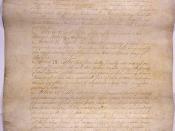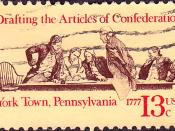On May 25, 1787, fifty-five delegates from twelve states met in Philadelphia to revise the Articles of Confederation. Instead, they decided to totally scrap the Articles and create a new Constitution, known as "a bundle of compromises." Whatever these leaders' personal desires, they had to compromise and adopt what was acceptable to the entirety of America, and what presumably would be suitable to the nation as a whole. There were many compromises made at the Constitutional Convention, such as representation, slavery, and laws concerning foreign/ interstate imports and exports.
The compromise of most importance was named the "Great Compromise." Delegates were quite interested in how their state will be represented in this recently independent country. Edmund Randolph, speaking for the state of Virginia, proposed the "large-state plan." This plan anticipated that representation for each state should be based on population. William Paterson, of New Jersey, disagreed with Randolph's plan, fearing that the stronger states would band together and ignore the smaller, less-populous states.
Therefore, the "small-state plan" was proposed, emphasizing equal representation from all states. After much argument, the Constitutional Confederation decided that the Congress would have two houses: the House of Representatives (where the number of representatives was based on the state's population), and the Senate (where each state would have two representatives). Virginia finally agreed with this negotiation when the Confederation promised that all tax bills and revenue measurements would start in the House of Representatives, where population counted more heavily. The second compromise was a strong, independent executive branch, with a president who would be military commander-in-chief and could veto the legislation. This president would be elected through the Electoral College, rather than by the people directly. Anti-federalists believed that the executive branch did not effectively represent the people, and that only the...


